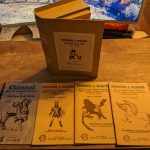I created a megadungeon in 2023 as part of the whole #Dungeon23 yearly project thing. To help keep me motivated, I began running a campaign while still creating the thing – as my players would most likely not be delving levels 4 and 5 while still first level! I resolved to run by using only the LBBs as written in 1974 – no supplements, a couple of houserules to smooth things out, or that are always present at my table (like Target20).
We just finished our first game of 2025 and I was shocked to realize it’s been two years of playing D&D like it was first published in 1974. I’m going to party like it’s 1976!
So what did I learn from the original little brown books during the first two year stretch?
 OD&D is ridiculously easy to run, with help from Traveller 1977.
OD&D is ridiculously easy to run, with help from Traveller 1977.
After a handful of games, I hardly look at the rule books anymore, except for saving throws and possible spell description adjudication. The players just play without worrying too much about “what class X can do” – and things just work easily.
So why did Traveller, written three years later, come to help my game? The 2d6 resolution roll. It’s just perfect for me. Simple for me to grasp and use in almost every situation I need. Low rolls go badly for the person/monsters rolling, high rolls go good. If it’s a task resolution, 8+ succeeds with modifiers for high or attributes (2-: -2, 3-7: -1, 13-17: +1, 18+: +2). For times when I don’t know if something will be easy or hard, a low roll indicates difficult to do (requiring 10 or 11+ to succeed) and a high roll indicates easy to do (requiring 4 or 6+ to succeed).
With the LBBs RAW and that mechanic as my houserule for “everything else that might need a roll and OD&D LBBs don’t have a table”, I can adjudicate virtually anything.
Playing “btb” makes for a far different game as compared later versions.
In OD&D LBBs, both magic users and clerics cast from spell books. They have a book for each spell level. The LBBs don’t give any direction on how those books are acquired or the nature of them, leaving that up to the referee.
This has led to a very interesting situation in my campaign, because the players are prisoners on a remote island, so they don’t have their churches or magical mentors to walk up to and obtain those books for Level 2, 3 and so on. This means looking for those books in interesting situations, such as other NPCs or wandering monsters that might have a cleric or magic user!
OD&D is very explicit on a wandering monster check per turn. However, in OD&D, that comes down to two “moves” per turn. It’s goofy but I’ve come to adjust to it in a particular way. I measure turns in real-time, or if the PCs make the equivalent of two full moves. It does make for pressuring the players to get a “move” on, to find the treasure rather than getting ambushed by non-treasure-bearing wandering foes.
For hit points, I interpreted the LBBs in such a way that players reroll their hp at each level up. They can never go lower in hit points, but this could mean they don’t increase their hp!
Little things like this have definitely given OD&D a different feel.
OD&D LBBs lead to a very different feel and approach by everyone
It is rare that I don’t end one of my OD&D/Dungeon23 sessions with both a “WTH just happened” feeling and a feeling of “that was so much fun!”
Part of that are the players. I have an illiterate cleric devoted to finding/robbing/grubbing gold. An asthmatic fighter who wants to have a heart of gold, but his incredulity, outrage and disbelief at his fellow party members keeps him floating in neutral territory. I have a psychopathic mage who will cheerfully stab you in the neck, but also try to get you a crapton of gold (as long as he’s getting an equal or larger share). I have another mage who is definitely keen on the “evil wizard” idea but hasn’t found his groove quite yet. A cold-blooded elven killer who has no time for this shit. A cleric of a rather well-endowed goddess who is trying desperately to not fall into the chaotic madness of the Black Maw, but is starting to teeter on the edge.
They play these characters so well, and they work so well together that I could spend days playing this game.
And I really feel like the open ended nature of the classes, of the open and light expectation of the rules, of the almost non-existent implied setting of the LBBs helped set the stage for these guys to make those characters happen. It’s glorious.
That sounds like a lovely game. Thanks for sharing!
You’re very welcome!
Love to see someone else combining the two different “LBB’s”: one set brown, the other black. OD&D + Classic Traveller is the oatmeal of a long, happy life. Thanks for sharing!
You’re welcome!
They just fit so well together. If I were playing Traveller77 and needed naval or air combat rules, I’d be tempted to look at the OD&D rules, as they just “work” pretty simply.
This is awesome Michael. Wow, just wow!
Thanks so much for sharing!
Thank you for the kind comment!
Miss the podcast too! 🙂 Be well Michael!
Thank you! I’ll keep blogging when a topic comes to mind 🙂 Great talking to you on the OD&D forum 🙂